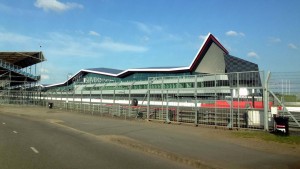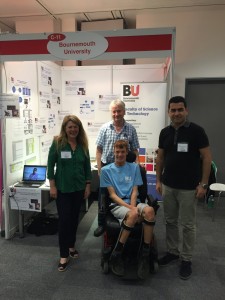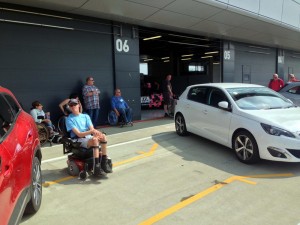
From the 26th – 28th May, my supervisor (Dr Huseyin Dogan) and I attended the 2016 Mobility Roadshow at Silverstone (Northamptonshire), where Bournemouth University had a stand thanks to QR funding, as a part of my PhD research. The roadshow is the UK’s original hands-on consumer event that has been showcasing mobility innovation for over 30 years. The roadshow is an annual event that takes place at different venues around the country and this year it was at the Silverstone circuit. The university’s stand was located in the Information Village and was a good opportunity to validate our research in the assistive technology domain with a user community of people with disability as well as manufacturers.
 The purpose of the validation was to present the SmartAbility Framework, which considers how technology can support people with disability and addresses the concept of not having a ‘single technology solution to suit all disabilities’. It consists of seven elements; Disabilities, Impairments, Range of Movements, Movement Characteristics, Interaction Mediums, Technologies and Tasks, interlinking aspects of Human Computer Interaction. The roadshow was the first opportunity to validate the framework as it had been developed based on state of the art literature reviews and results from conducted feasibility trials and user experimentations. The validation was performed using a paper-based version of the framework and involved the participants/manufacturers completing the first four elements, to describe how their disabilities affect their Range of Movement. The knowledge contained within the framework was then used to provide recommendations of suitable Interaction Mediums and Technologies that could potentially improve their quality of life. Each participant completed a questionnaire to provide their views on the framework. In addition to the validation, we demonstrated Smartglasses (a Recon Jet), to assess the usability for people with disability.
The purpose of the validation was to present the SmartAbility Framework, which considers how technology can support people with disability and addresses the concept of not having a ‘single technology solution to suit all disabilities’. It consists of seven elements; Disabilities, Impairments, Range of Movements, Movement Characteristics, Interaction Mediums, Technologies and Tasks, interlinking aspects of Human Computer Interaction. The roadshow was the first opportunity to validate the framework as it had been developed based on state of the art literature reviews and results from conducted feasibility trials and user experimentations. The validation was performed using a paper-based version of the framework and involved the participants/manufacturers completing the first four elements, to describe how their disabilities affect their Range of Movement. The knowledge contained within the framework was then used to provide recommendations of suitable Interaction Mediums and Technologies that could potentially improve their quality of life. Each participant completed a questionnaire to provide their views on the framework. In addition to the validation, we demonstrated Smartglasses (a Recon Jet), to assess the usability for people with disability.
Over the 3 days of the roadshow, we had 36 participants that all provided positive feedback, therefore, proving the usefulness of the framework. Improvements were also suggested from some of the participants which will be used to enhance the framework. The technology recommendations were helpful as a number of the participants were not aware of some of the technologies. Not all participants were able to use the Smartglasses due to impaired vision or finger dexterity. However, the participants who were able to interact enjoyed the experience as it was new to them.

The roadshow exhibits a range of products for people with disability as well as adapted cars and wheelchair accessible vehicles. As the roadshow was at Silverstone, visitors had the opportunity to test drive a range of vehicles around 2 laps of the short National circuit. This was an opportunity not to be missed and when I wasn’t manning our stand, I test drove a range of vehicles including a Ford EcoSport and BMW 2-series. Unfortunately, there was a 40 mph speed limit imposed on the circuit (for safety reasons), but one of the instructors allowed me to do 50 mph on the Hanger straight and follow the racing line on the corners! I chose to have the final test drive slot on the last day and was able to do 5 laps as the instructor didn’t want to clear up in the pits!
Overall, attending the Mobility Roadshow was an enjoyable experience and provided valuable results and knowledge for the final stage of my PhD, which I am aiming to complete in November. The future research activities will involve validation with domain experts from computing and healthcare and designing for the SmartAbility Framework to be exploited as a smartphone application. There is also the small task of writing up my thesis…











 Beyond Academia: Exploring Career Options for Early Career Researchers – Online Workshop
Beyond Academia: Exploring Career Options for Early Career Researchers – Online Workshop UKCGE Recognised Research Supervision Programme: Deadline Approaching
UKCGE Recognised Research Supervision Programme: Deadline Approaching SPROUT: From Sustainable Research to Sustainable Research Lives
SPROUT: From Sustainable Research to Sustainable Research Lives BRIAN upgrade and new look
BRIAN upgrade and new look Seeing the fruits of your labour in Bangladesh
Seeing the fruits of your labour in Bangladesh ECR Funding Open Call: Research Culture & Community Grant – Apply now
ECR Funding Open Call: Research Culture & Community Grant – Apply now ECR Funding Open Call: Research Culture & Community Grant – Application Deadline Friday 12 December
ECR Funding Open Call: Research Culture & Community Grant – Application Deadline Friday 12 December MSCA Postdoctoral Fellowships 2025 Call
MSCA Postdoctoral Fellowships 2025 Call ERC Advanced Grant 2025 Webinar
ERC Advanced Grant 2025 Webinar Update on UKRO services
Update on UKRO services European research project exploring use of ‘virtual twins’ to better manage metabolic associated fatty liver disease
European research project exploring use of ‘virtual twins’ to better manage metabolic associated fatty liver disease